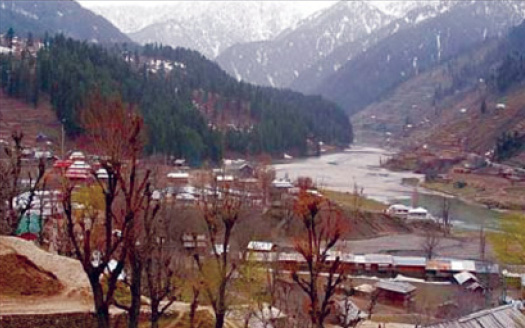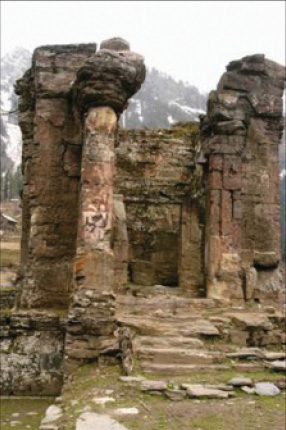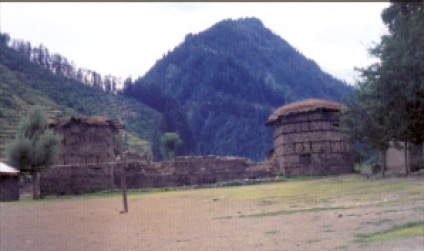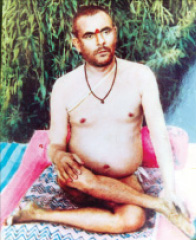Kashmiri Pandits - The Last Journey From Sarda
By RKS Shandilya
Village Sardi, which houses the holy shrine of Goddess Sharda, is perhaps the most scenic place in 'Kishenganga (Neelam) Valley'. It lies about 20 kms to the north of Muzaffarabad. Till 1974 the village had no motorised transport link with the outside world. Due to its strategic importance Maharaja Gulab Singh had constructed a fort here. Dogra Kings maintained here a permanent military post. In October 1947 the garrison was headed by Pt. Sham Lal Khushu, the Thanedar.
Kashmiri Pandit population:
In 1947 the Kashmiri Pandit population of Sharda included the shopkeepers, the purohits and the employees. Swami Nand Lal, a saint of great merit had his kutiya at Sharda. He would stay here during summers. There were three shops run by Kashmiri Pandits. Tika Lal and Nand Lal Thusu, the two brothers who belonged to Lidderwan, had shops at Sharda and Dudniyal. Nath Ram of Seer Jagir and Dina Nath of Tikr ran another shop. The other shop belonged to Deva Ram and his brothers, who hailed from Gotheng.

Pt. Sat Lal and Pt. Govind Ram Bhat served as Purohits at the shrine. There were many Pandit employees in the area, serving mostly in Forest Department. Pt. Shridhar Dhar, Conservator of Forests and resident of Chotta Bazar, Srinagar had served in the area in different capacities. A great devotee of Goddess Sarda, he used to perform havan on every Sarda Ashtmi at Sarda. Most of the employees in the forest department in Kupwara region had been recruited by him.
Tribal Invasion:
Soon after the news about the 1947 disturbances (tribal raid) reached Dudniyal, Pt. Sona Lal Thusu, son of Tika Ram, closed the shop. He entrusted his belongings to the care of his servants and moved to Lidderwan (Kashmir). Pt. Jagadhar Bhat (Patwari) and Sham Lal Gagru (of Karahama), a forest guard were his companions on this journey.
Kashmiri Pandits in Sarda came to know about ribal invasion from Sultan Malik, servant of Pt. Dina Nath, the shopkeeper. Malik had brought a letter from Dina Nath's family at Tikr.
Dr. Gauri Shankar, the Ayurvedic doctor had already left. His Dawasaz (Pharmacist) Pt. Narayan Joo Pujari (brother of Purohit Govind Joo) left along with his family members, which included Govind Ram's wife, children, besides Nand Lal Pujari's mother, Parvati diyad. Parvati had a local friend called Zeba. One day Parvati sensed the gravity of the situation from her conversation with Zeba. Apprehension that invasion could force them to change their faith, Parvati asked her family members to pack belongings immediately and leave for Gotheng.

The purohit family left Sarda the following day at 4 AM and reached Jumagand in the forest range at 4 PM. The family was carrying ten kgs of Silver, which they had received as Chadav (offerings). Locals of Jumagand robbed them of Silver and other valuables. They also ordered them to dismount from the horses. The family marched to Lidderwan on foot. The horseman (Markban) returned with horses from Jumagand the next evening and narrated to Kashmiri Pandits at Sarda what all had happened.
Swami Nand Lal Ji had refused to leave Sarda till Pandit employees from periphery of Sarda also returned. The day Pujari family left for Lidderwan, Swami Ji had organised a mehfil at his Kutiya at around 2 PM. This was attended by Nath Ji Razdan (the shopkeeper) of Gotheng, Dina Nath Tikr, Shamboo Nath of Zolura, Shamboo Nath Thusu, a Kuth Watcher, Hriday Nath Kaw, the Forestor, Shridhar Joo of Goshbug, and two Pandit constables from Malmoh. Pt. Govind Ram Pujari, his brother Prakash Ram and Thanedar Sham Lal Khushu of Srinagar were also present in this gathering. Prakash Ram was an employee in the forest department. Thanedar functioned as administrator of Sarda and operated from fort. He was in his mid fifties.
Normally Fort was a forbidden territory for the public. In the mehfil one of the Pandit employees requested Thanedar to get Kashmiri Pandits into the fort on some pretext in view of prevailing security situation. Pt. Sham Lal who was slow in understanding the gravity of the situation virtually flew into a rage and threatened to arrest the employee who suggested this. Thanedar accused the employee of spreading panic. Prakash Ram calmed Sham Lal down, arguing that the particular employee was a man of little consequence. This had sobering effect on Thanedar.
The horseman (Markban) who had accompanied Purohit family to Jumagund came to see Swami Nand Lal Ji and narrated to him how the Purohit family was robbed of silver and divested of horses. Swami Ji was now desperate to go to Kashmir but expressed his inability to walk. He asked Pt. Shamboo Nath Thusu and Pt. Shridhar Joo to fetch a horse for him from Ram Saran Das, a shopkeeper at Surgan-a village 6 kms from Sarda Surgan is 8 miles from Nurinarsar, the latter separates Sarda. Valley from Kaghan Valley in Yagistan (Chilas). Ram Saran Dass's family was also with him. Both Thusu and Shridhar Joo were Kuth watchers. Govt. had issued doublebored rifles to them.
Fort Captured:
In October 1947 when locals were talking in whispering tones about the invasion, Thanedar Sham Lal had secretly despatched two Dogra soldiers to Srinagar to ask for reinforcements. While the soldiers were still in Handwara they received the disturbing news about the invasion. One of them returned to Sarda to put Thanedar on alert. Thanedar had a force of 11 constables—4 Dogra soldiers, six constables from the majority community in Kashmir valley and Kartar Singh, a Sikh from Hamal, Rafiabad.

Shridhar Joo and Shamboo Nath Thusu left for Surgan, carrying a rifle with them, to fetch horse for Swamiji. The same night Wali Mohammad, son of Sayid Ahmed Sardar entered the fort. Wali Mohammad was a forester and belonged to Kharigam, a village 2 kms from Sarda. The drama began with six constables of the majority community asking Thanedar to open the ammunition room (Kuhth). They told him that situation was grim and asked him to open the ammunition room so that they could take out the ammunition. As Thanedar opened the ammunition room, Ahmed Khan, a constable, pushed him in and locked the room from outside. Khan hurled choicest abuses on him. This constable hailed from Srinagar city and had been recruited in police in 1933. In this confusion four Dogra soldiers managed to escape while Kartar Singh was taken captive.
Meanwhile, a constable who manned the outer gate of the fort and was carrying a rifle asked Thanedar to surrender. Pt. Sham Lal was handcuffed and taken as captive, Maharaja's flag was burnt and a new 'Pakistan' flag fashioned from the blue turban was hoisted. Wali Mohammed, the forester, became self-styled administrator of Sarda. The forester and around 50 locals then went to Swami ji's kutiya, asking Pandits there to change their faith, Janki Nath Thusu was renamed as Jan Khan.
Shamboo Nath Thusu and Shridhar Joo left Surgan the next morning after taking horse from Ram Saran. At Dunarian, 2 kms down from Surgan the duo met Mohammad Hakim, a peon in Forest Range office at Sarda. He was carrying a message for Shamboo Nath Thusu from his brother Janki Nath. The message carried information of the happenings of the previous day-the hoisting of 'Pak' flag and conversion of Kashmiri Pandit and holding them as captives. It impressed upon Thusu to change his faith and also suggested new name for him. Mohammad Hakim forced them to hand over the rifle to him.
Swamiji and other Kashmiri Pandits were waiting for SN Thusu and Shridhar Joo and had already decided to leave. Numberdar Mir Zaman, a man with deep secular convictions, had told Swamiji that the situation was fast deteriorating and had impressed upon him to leave. Swamiji was held in high esteem by local Muslims of Sarda. Locals advised him to take Sinjli route and not Dudniyal route which otherwise was easier. They feared that Dudniyal may already have come under the sway of raiders. Locals were quite sympathetic.

First Journey:
Swamiji and Pandits began journey back home at 10 AM the same day. Swamiji had hardly walked 2 miles of the uphil journey when he gave up and refused to walk any further. Meanwhile, Mir Zaman's messenger caught up with them and advised them to return to Sarda immediately. Two locals, armed with axes, had been following them. They had lost the track and had gone ahead of Pandits. After having learnt about it Mir Zaman got worried about the safety of Pandits. The deep concern Mir Zaman showed about the safety of Pandits in those turbulent times is remembered by Pandits to this day.
Mir Zaman, the saviour:
Mir Zaman heaved sigh of relief when Kashmiri Pandits returned to Sarda. He had already convened a Jirga (meeting of local elders) in the courtyard of his house. Kashmiri Pandits also joined them on one side. Mir Zaman admonished his community brethren, asking them why did they not restrain the two locals who had gone with axes to harm Swamiji and others. He warned them that it was not easy to kill Pandits. Mir Zaman concluded his address by saying with concern and authority that Kashmiri Pandits were his guests and would stay with him.
Mir Zaman had already arranged a room for Pandits in his house and had spread grass on the floor. Within two hours all the belongings and the provisions in the three shops owned by Pandits reached the new 'hideout' of Pandits. Mir Zaman had also arranged a Chulha in the room. Numberdar was in his early sixties. He asked Pandits to lit the fire and prepare the food. Mir Zaman emphatically told Pandits that they should cook food in their own way and added that it was not his religion to impose things on others. Janki Nath, Nath Ji Razdan, Shamboo Nath Thusu and Shridhar Joo used to attend to kitchen work by turns, with Shridhar Joo maintaining overall supervision.
During the month Pandits stayed in the house of Mir Zaman, the latter took extremely good care of them. He and his wife would sleep near the door of Pandits' room to keep watch on any stranger straying into their room. Locals would of and on ask Mir Zaman whether the Pandits were following the new faith with sincerity. He would put them off by telling that the Pandits were observing new faith all the time. He would then come to Pandits and tell them, 'Rascals, why you are not performing your own pujas?' Mir Zaman kept locals away from visiting Pandits.
One day Swamiji felt like smoking his own special tobacco he had kept in hiskutiya, located 1 mile away from Mir Zaman's house. A Pandit employee not only got the sack of tobacco but also ensured that nobody saw him while going to the kutiya in the afternoon.
On another occasion Thanedar Sham Lal was brought to Mir Zaman's house to show to Pandits that he was alive. Kartar Singh's beard and hair had been trimmed. All the non-Muslims who were in Sarda were forced to change their faith.
Latif Malik and Barkatullah Khan intervene:
Meanwhile Nand Ram Thusu of Lidderwan whose two sons-Janki Nath and Shamboo Nath were among the captives in Sarda contacted his friend Latif Malik, a Zaildar of Changan (Dudniyal) through a messenger, Nabir Sheikh of Kawari. Nand Ram had asked Latif to help him to see his sons reach home safely. In the prevailing situation Latif Malik had little authority as Zaildar. Wali Mohammad was the sole authority that mattered. Latif, however, assured Nabir Sheikh that he would do his best to help Nand Ram.
Pak troops had still not entered Sarda. Mir Zaman's house was 1½ miles away from the fort, while the Sarda shrine was just at a distance of 1 mile. Shops of Kashmiri Pandits were located in the shrine area. For a month Kashmiri Pandits holed up in Sarda had remained cut off from the outside world. Lateef Malik contacted Wali Mohammad, the self-styled administrator and asked him, "What these Pandits would do here? It was Pakistan now.Let them go". Another person who came to Sarda to intervene for their release was Barkatullah Khan of Kawari.
Through the intervention of Barkatullah Khan and Latif Malik, Kashmiri Pandits were set free. Mir Zaman asked Barkatullah Khan to take care of Pandits for their onward journey to Lidderwan. The Pandits left at 11 AM, carrying maize bread and Kishmish-Zirish along with them and reached Dudniyal at 7 PM. It was dark by now.
The shops of Thusu family were locked. The godowns of Jodhamal Kutiyal were located in the same building on the second storey. Pt. Sona Lal Thusu and Amar Nath who also worked with Jodhamal had already returned to Lidderwan. Amarnath also functioned as guard of the bridge at Dudniyal.
At Barkatullah's advice Pandits decided to spend the night at the house of Sharif Dar, a forest guard. The latter's father, Satar Dar had business partnership in water-mill with Sona Lal Thusu. Sharif's family was still hospitable and courteous. They helped Pandits to relieve their fatigue by bringing maize bread and a samovar of salt tea. Janki Nath suggested to Sharif, "This sadhu (Swami Ji) has not taken salt for ten years. I will prepare tea for him separately". Janki Nath prepared kahwa for him. Swamiji tookkahwa and the maize bread they had carried from Sarda.
Thusu Shops Burnt:
It was 11 PM. Pandits were still gossiping on the road when they heard the sound of a bullet shot. Shops of Thusus had been put to arson, the godowns of Jodhamal Kutiyal also perished in the fire. However, the two three-storeyed houses owned by Thusus located some distance away remained safe. Rai Bahadur Ishar Dass's godowns, a school and a sarai were housed in these houses. The ladies of Dar household cried bitterly that the 'shops of our Pandits have been burnt'. Pandits told them that they had built these shops and hoped that they would rebuild these.
At the morning breakfast at Dar's house Pandits were joined by many locals. Pandits asked the locals why did they put their shops to arson even after they had converted. The locals claimed that the accused had been identified and claimed that he would be taught a good lesson.
Soon Pandits reached Potkhai (Marhama) gully. From here there was a steep climb of 1½ kms over one foot deep snow. Swamiji gave up and could not walk any further. Janki Nath warmed him up with hot kahwa. Nathji and Shamboo Nath Thusu carried Swamiji on shoulders upto Marhama gully top. From here they could see Kashmir—their home. Swamiji was thrilled and puffed his special tobacco. In downhill journey towards Lidderwan he moved like a tiger taking 5-7 steps together.
Zirhama:
While passing through Zirhama Pandits were a little apprehensive. Soon after the raid a Sikh youth had been killed here while his younger brother had been saved by Karim Sheikh of Kawari. Karim had given him shelter in his house. When situation improved he brought him to Kupwara Thana. The two Sikh brothers were running a shop in Sarda and used to sell army shoes and clothes. While fleeing Sarda a mob had attacked them at Zirhama, one km from Lidderwan. When Pandits reached Zirhama, the mob had moved towards Lidderwan.
Thanedar Suspended:
Thanedar Sham Lal reached Srinagar a few months later. He and constable Kartar Singh were shifted from Fort to a Kotha (a Kacha Hut) and were put under house-arrest. Kartar was taken daily to the Kishenganga river by 'soldiers'. They would terrorise him by asking their colleagues to open fire at him. One day Thanedar and Kartar decided to escape. The door of Kotha made lot of noise on being opened. The duo put some dust and dirty water around it to ensure that it did not make any noise. They ran away during the night. Their gum ammunition shoes helped them cover 26 miles over snow to reach Kupwara.
At Srinagar Sham Lal had another surprise in store for him. He was put under suspension and remained without pay for many months. Thanedar was shocked to see a constable attending his duties at Hari Parbhat Fort. This constable was among those who had stormed the Fort at Sarda and hoisted Pakistani flag.
Source: Kashmir Sentinel



